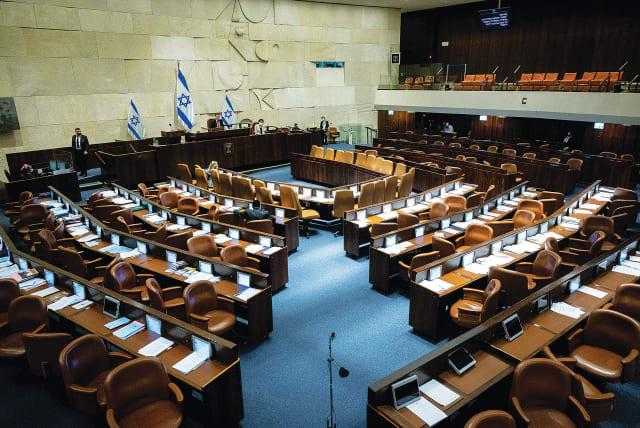War threatens women's progress in the political sphere, study finds

Many argue that this lack of female input is responsible for errors made since October 7 and before – but there has been no proof.
There are currently very few influential women in the Israeli government, the Knesset, the professional level of government ministries, and even the Israel Defense Forces and security forces.
Many argue that this lack of female input is responsible for errors made since October 7 and before – but there has been no proof. Now, a study from the University of Washington in St. Louis, based on the Russian/Ukrainian war and published in the journal International Organization under the title “Women and Men Politicians’ Response to War: Evidence from Ukraine,” argues that women’s participation in politics is essential and that progress women have made in politics is threatened when conflict strikes.
A quarter of parliamentary positions worldwide are held by women; although current representation is still far from equal, it represents a significant increase over the last 20 years – but in the current Israeli government, female representation is negligible. Only two women have ever served as foreign ministers (Golda Meir and Tzipi Livni). No woman has ever held the other two most prestigious portfolios, defense and finance. Over the last 15 years, not a single woman has served in any of Israel's most senior political positions – as premier, defense minister, finance minister, or foreign minister.
The University of Washington study show that violent conflict pushes politicians to conform more strongly with traditional gender stereotypes, so that men become more politically engaged than women, and politicians are inclined to adopt their respective gendered communication styles and issues. The authors also maintain that gender biases among the public are magnified during war.
“Women’s engagement during conflict relative to men’s could also affect their presence and role in the post-conflict recovery process, where women’s leadership has been shown to decrease violence and help with postwar reconstruction. That the number of active conflicts is at a historic high,” they wrote, “further highlights the pressing need to understand how women and men politicians behave during war.”
Ukrainian politicians' involvement in social media

Prof. Margit Tavits conducted an analysis of Ukrainian politicians’ involvement in social media in the months leading up to and after the 2022 Russian invasion of Ukraine – a rare opportunity to observe the effect conflict has on politicians’ behavior in real time.
The team proved violent conflict pushes politicians to conform more strongly with traditional gender stereotypes, so that men become more politically engaged than women, and politicians gravitate toward their respective gendered communication styles and issue spaces. They also show that gender biases among the public are magnified during war.
“Our findings suggest that women leaders’ voices may be drowned out by their male counterparts during conflict, which is troubling,” Tavits said. “We know that who engages, and how, in response to conflict can have significant consequences for how the conflict unfolds, how long it lasts, whose concerns are heard and represented and so on.”
They analyzed 136,000 Facebook posts made by 469 politicians over a seven-month period to study the effect that conflict had on politicians’ public engagement. Although the data were limited to a specific type of behavior – politicians’ engagement with the public on social media – the researchers said this allowed them to observe how each politician engaged with the public on a daily basis.
Before the invasion, Ukrainian politicians of both genders had similar levels of engagement on social media, but both raised their level of public engagement on social media with the onset of the conflict, women’s engagement did not increase as much as men’s. On average, men politicians were publishing one-half of a post more per day than women politicians in the early days of the conflict.
It wasn’t just the quantity of posts that differed; the content was also different. The analysis showed women politicians were more likely to take on a more nurturing role, display positive sentiment in their messages and focus on traditionally feminine topics, while men politicians discussed the security issues more directly and depicted themselves as strong, protective leaders.
They showed that the public’s reaction to these posts also changed. Before the invasion, social media posts made by politicians of both genders received about the same number of reactions from voters. Once the conflict began, though, social media posts made by male politicians received significantly more engagement from the public – a fact that the researchers said reflects increased gender biases among the public.
“There’s a strong association between masculinity and combat,” Tavits said. “Combat and external threats are traditionally seen as ‘men’s issues.’ During times of crisis, individuals are more likely to prefer men — who are expected to be aggressive and decisive, in leadership roles, and women are expected to be affectionate and nurturing and are believed to be better suited for communal caregiving tasks.”
Jerusalem Post Store
`; document.getElementById("linkPremium").innerHTML = cont; var divWithLink = document.getElementById("premium-link"); if (divWithLink !== null && divWithLink !== 'undefined') { divWithLink.style.border = "solid 1px #cb0f3e"; divWithLink.style.textAlign = "center"; divWithLink.style.marginBottom = "15px"; divWithLink.style.marginTop = "15px"; divWithLink.style.width = "100%"; divWithLink.style.backgroundColor = "#122952"; divWithLink.style.color = "#ffffff"; divWithLink.style.lineHeight = "1.5"; } } (function (v, i) { });
